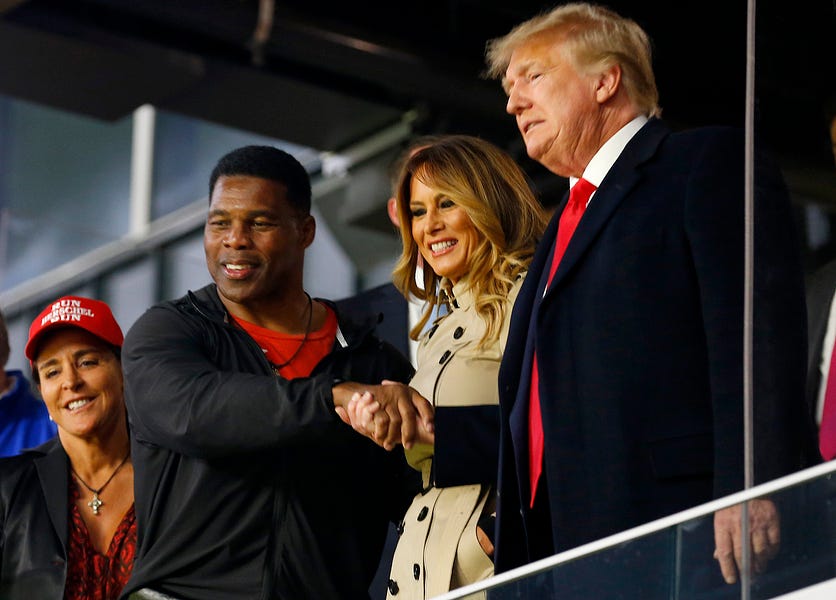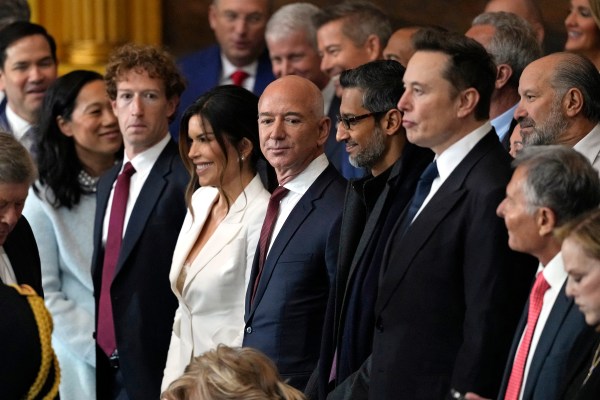Herschel Walker reportedly once pointed a gun at his wife’s head and threatened to “blow her brains out.” He lied about working in law enforcement and serving as an FBI agent. After years of haranguing absentee fathers, he admitted to having three children that he had not disclosed publicly. He has questioned evolution, asking “Why are there still apes? Think about it.”
Several weeks ago, despite having lived near Dallas for a decade, Walker won the Republican Senate primary in Georgia. Walker now moves on to challenge Sen. Raphael Warnock, who won a special election in January 2021.
Walker won the GOP primary with 68 percent of the vote because—despite all his flaws—he has the one thing that matters most as a Republican candidate: celebrity. Sure, he may have endorsed a magical “dry mist” that would “kill any covid (sic) on your body” and may believe that air pollution is caused by China sending us its “bad air.” But before all that, he was a college football star at the University of Georgia and enjoys universal name recognition in the state.
And now, the balance of the U.S. Senate may hinge on his electability.
Republicans didn’t urge Walker to get into the race because of his positions on immigration or the child tax credit or because he has a plan to fight inflation. He didn’t work his way up to this by getting elected to the Georgia state house or any other office. He simply had the one thing no other candidate could match: fame. Voters have heard of him.
Republicans have watched for decades as progressives commandeered all the levers of American culture. While Hollywood celebrities casually demagogue for the left on climate change, gun control, voting rights, and social issues, the biggest celebrities who spoke from the right were Ferris Bueller’s economics teacher and a washed-up Ted Nugent.
Sure, Democrats have had their occasional celebrity politician. Al Franken, for instance, took a career at Saturday Night Live and parlayed it into a Senate seat from his home state of Minnesota.
But for the most part, liberal celebrities decline the chance to run for office. Just last week, an opinion piece in Politico suggested comedian Jon Stewart would have a good chance of winning if he were to run for president as a Democrat in 2024. Stewart quickly said “no thank you.”
Perhaps conservative celebrities don’t get as much attention in Hollywood, as they are (with a few exceptions) often of the B-, C-, and D-list variety of famous person. They likely turn to politics to make the mark they couldn’t make in film or television, which may explain why there are more of them.
Some famous people have run for office as Republicans, but mostly after their stars faded. Sonny Bono (singer and mustache enthusiast), Fred Grandy (“Gopher” on Love Boat) and Steve Largent (NFL Hall of Fame wide receiver) all won seats in Congress as Republicans. Former NFL quarterback Jack Kemp was a mainstay in the party for years. Chances are your grandparents bought life insurance after seeing a commercial starring Tennessee Sen. (and Law & Order star) Fred Thompson. Arnold Schwarzenegger became perhaps the last Republican governor of California.
One difference between those men and Walker is that they took their jobs seriously. Kemp, called the “most important politician of the 20th century who was not president,” was the Republican Party’s leading voice on supply-side economics, arguing that lower taxes and less regulation would spur economic growth. Sonny Bono worked his way up to Congress after serving four years as mayor of Palm Springs, Calif. Fred Thompson was a national political figure from the time he served on the Watergate committee in 1973 until his death in 2015. (It was Thompson’s questioning of White House aide Alexander Butterfield that uncovered the fact the Oval Office was fitted with secret listening devices.)
And then came Donald Trump.
Trump, who had spent his life as a political nomad who frequently donated money to Democrats (including $100,000 to the Clinton Foundation) and flirted with a 2000 presidential run as a member of the Reform Party, decided to permanently become a Republican and flirted with a presidential run in 2012. Trump was a real celebrity—someone who had managed to keep his name in the headlines for years and who ran in circles with some of America’s biggest names.
Trump wasn’t conservative, wasn’t religious, and didn’t mind appealing to people with antiquated views on race and gender roles. But the party followed his lead, believing he was a leader (he had told them so for years on The Apprentice) and because he made all his enemies on the left look as if they had just swallowed a lemon.
Trump’s success then served as a blueprint for famous people who had no political history but aspired to run for office. In fact, in the Trump era, all you need to win a GOP primary is name recognition and a healthy obeisance to Trump himself.
In 2020, former Auburn football coach Tommy Tuberville won a U.S. Senate seat. This year, Mehmet Oz, a television doctor with a history of selling quack medicines, narrowly won a GOP Pennsylvania Senate primary. J.D. Vance, bestselling author of the book (and later movie) Hillbilly Elegy, cast aside his early criticisms of Trump and became an acolyte of the former president on his way to winning a Senate primary in Ohio.
And, of course, now there is Walker.
Aside from their fame, all of these candidates have another thing in common—they were all endorsed by Trump, whose admiration for celebrity is well-documented. Trump even endorsed Tuberville, who led the Auburn Tigers to an undefeated season in 2004, over his own former attorney general, Jeff Sessions.
The desire for celebrity within the party is now so strong that it’s shaping how non-famous elected officials behave once they are in office. Majorie Taylor Greene was stripped of her committee assignments, but that just gives her more time for tweeting and Newsmax appearances. Madison Cawthorn might have said it best when, after being elected, he emailed colleagues that “I have built my staff around comms rather than legislation.”
These people didn’t win a Heisman Trophy or write a bestselling book—they are trying to take the celebrity path to higher office after they’ve already been elected.
The primary casualty of celebrity politics has been actual conservatism, which has vanished as a governing philosophy. Post-liberal Republicans have dropped any desire for small government, instead arguing government will be better once they are in charge of it. In this new Republican utopia, privately run social media platforms will be forced to host content that may be dangerous or illegal, federal entitlement reform will be a verboten topic, and companies will pay higher taxes if anyone in the break room is caught discussing RuPaul’s Drag Race.
But there is a sliver of good news for the traditional conservatives horrified by their party’s capitulation to ideologically blank celebrities: The thirst for cultural relevance that got Republicans to abandon decades’ worth of positions could also be the way for the party to restore some sense of sanity.
If a legitimate celebrity were to come along and make a principled case for limited government and less regulation, he or she would immediately have the ear of those tired of defending a twice-impeached president who incited an insurrection. The thing that has kept Trump alive in the party isn’t that the rank-and-file love him, it’s that no bigger celebrity has shown up to knock him off.
Consider what would happen if a major celebrity went all in on restoring conservatism to the GOP. Not “senator from Utah” famous or “was once in a Star Wars-adjacent show” famous. But legitimately a household name, as Trump was.
The Trump years have demonstrated that the Republican Party will bend its ideals in acquiescence to any celebrity who wants to join its ranks. A party that wants parents to sue teachers if they mention transgenderism has no problem boasting of Caitlyn Jenner being a visible part of its ranks. If Kanye West—who once complained on national television that George W. Bush hates black people—wants in the party, well come on in!
But what if a big star wanted to use their celebrity for the forces of good?
Suppose former football star Peyton Manning (who was rumored to be a candidate for a Senate seat in 2018, but said he had “zero interest in being a politician”) decided it was his duty to make his party a little less insurrectioney. What if Dwayne “The Rock” Johnson (speaker at the 2000 Republican National Convention) wanted to mold the GOP in the image he enjoyed when he was growing up? Republican voters would definitely smell what he was cooking.
Of course, finding such a person would be a challenge. Few celebrities—especially conservative ones—want to make political enemies of their fans. This is why Republicans have spent decades whispering about which big names might be “one of them.” This generally requires some detective work, like “Adam Sandler was once a registered Republican” and “Chris Pratt once said a prayer.”
Unfortunately, forced loyalty to Trump has caused the erosion of the GOP as the party of ideas. But Republican voters would undoubtedly follow a big name candidate back to its principles.
“Imagine a congress of eminent celebrities,” Lord Acton told Mary Gladstone in an 1881 letter. “The result would be an Encyclopedia of error.”
That encyclopedia of error is currently the GOP’s bible. The party simply needs to swap in a more palatable set of volumes.






Please note that we at The Dispatch hold ourselves, our work, and our commenters to a higher standard than other places on the internet. We welcome comments that foster genuine debate or discussion—including comments critical of us or our work—but responses that include ad hominem attacks on fellow Dispatch members or are intended to stoke fear and anger may be moderated.
With your membership, you only have the ability to comment on The Morning Dispatch articles. Consider upgrading to join the conversation everywhere.